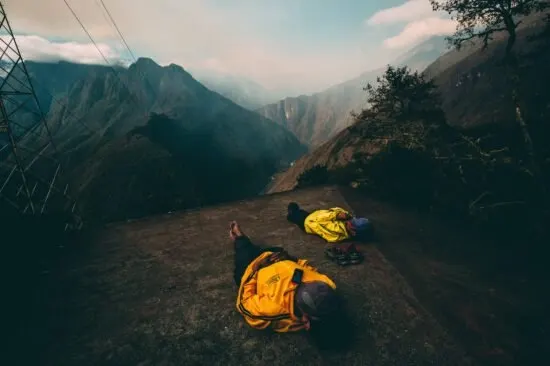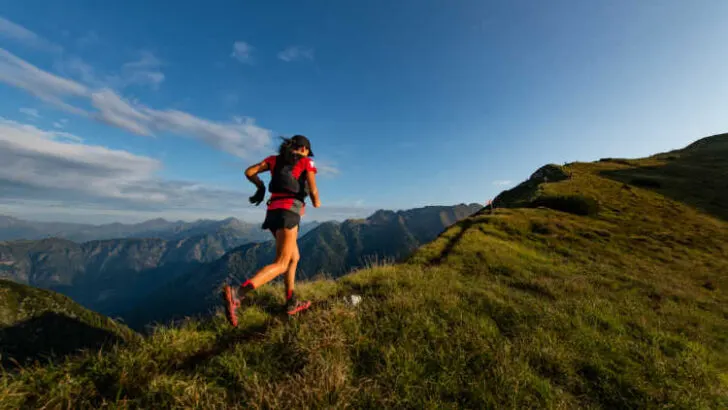For those new to the extreme sport of ultramarathon running, the number of variables to consider may seem overwhelming. Some of the most commonly asked questions are in regards to rest and sleep during an ultramarathon. For most, it can take 24 hours or more to run 100 miles, so do you sleep during a 100-mile run?
When it comes to sleep during a 100-mile run, this will depend entirely on individual preference. Some choose to take long naps, others short naps, and the majority take no naps at all. The important thing is to weigh the pros and cons in determining the most advantageous strategy for you.
In this article, we will be going over all things sleep, related to running a 100-mile ultramarathon. We will discuss the various sleep strategies implemented by the top ultramarathon runners in the world and the philosophies behind them. By the conclusion of this article, you will have no doubt about sleep practices for running 100 miles, so keep reading.
Sleep During a 100 Mile Run
To understand the effects of sleeping during an ultramarathon, we should first take a brief look at the effects of sleep in general. Sleep is not a static state, but rather, it relies on four transitory stages, each with its own set of physiological effects and benefits.
Some of these sleep stages, primarily the third, have the unique benefit of increasing growth hormone secretion via the pituitary gland, which can greatly aid in the reparation of damaged muscle tissue.
The only problem with this is that it can take up to 40 minutes to reach the third sleep stage, and you’re here to run 100 miles, not to sleep. Oversleeping can have the effect of lulling you in and making it incredibly miserable to wake yourself back up. This is an ultramarathoner’s worst nightmare (no pun intended).
What will your 100 miler sleep strategy be?
Now we come to the question everyone wants to know, do you sleep during a 100-mile run? The answer to this is that some do, while others (most) do not. Ultramarathoning is a sport where every little strategic detail makes a significant difference between success and failure. One miscalculation could prove disastrous. Running 100 miles is as much of a mental test as it is physical.
Because of this, every ultramarathoner will have their philosophies, techniques, rituals, and dogmas that they feel personally benefit them. There is no one clear answer to the question of whether or not to sleep on a 100-mile race. The answer is, quite simply, whatever helps you finish.
Choosing Your Sleep Strategy
In this section, we will discuss in detail the three techniques for sleeping during a 100-mile marathon. It is important to keep in mind that while scientific research in this field is, of course, indispensable, superstition and personal belief systems can have a certain way of prevailing over even the most conclusive studies at times.
Put simply, if you truly believe that something works best for you, chances are, through that belief in itself, it will. An important point to note here is that if you decide to nap, set an alarm to wake you up, and notify a member of the race crew as an insurance policy to ensure you do not accidentally end up sleeping through the entire remainder of the run.
If you require a reliable alarm clock that will never let you down, consider the CoolFire Vibrating Wristband. This alarm is built into a comfortable, sweat-preventing wristband and vibrates as well as rings to ensure that you never oversleep during a run.
Choose a safe place where you will not be hurt or lost, and avoid getting too comfortable. Napping while sitting upright with your head supported is ideal. Getting overly comfortable will increase the difficulty of getting back up when that alarm goes off.
Short Naps
The first technique discussed here is the short nap approach. Studies have shown that a 10-minute nap can considerably improve mental and physical function.
This can be very beneficial from a strategic perspective because not only will a 10-minute nap not cost a marathoner too much time (10 minutes is a small price to pay if it helps to improve performance), but it is also very easy to wake up from.
Contrary to long naps—which run the risk of leaving you feeling groggy, sluggish, and wanting more sleep—short naps will put an extra bounce in your step without all the drain and drag of sleep inertia.

Long Naps
Long naps are the more controversial of the two pro-sleep approaches for reasons we will now discuss. The logical thought-process behind taking a long nap (90 minutes approx) is that it gives the body adequate time to fully cycle through all four sleep stages, as it is naturally designed to do.
If done properly, this may provide the runner with a huge rejuvenation effect and give them a second wind that can, in turn, allow them to come back and dominate the other competitors, who will no doubt be battling exhaustion.
Timing a 90-minute sleep perfectly in the middle of an ultramarathon can be like gaining a new set of legs. However, there are many risks associated with a nap of such extended duration. A 90-minute nap may be impossible to wake up from. Sometimes the body just says it has had enough, at which point no amount of mental toughness or intrinsic motivation can overcome the urge to lay down and not get up.
If the racer does emerge from a full sleep cycle, they may have a brief confused and delayed reaction to the reality that they still have more miles ahead of them. Said differently, after 90 minutes of rest, a runner may not be immediately aware that they are still participating in a race, and it may take some time to shake the cobwebs off and refocus the mind for the task at hand.
Also read:
How Long Does A 100 Mile Run Take?
Altra vs. Hoka Trail Running Shoes (Pros / Cons and FAQs)
No Sleep at All
Finally, we come to the most straightforward and stubborn approach of all, the no sleep method. The no sleep approach may seem foolish to the reader after explaining the scientific advantages that resting during a race can provide. Still, a closer look will reveal that not sleeping during a 100-mile marathon may just be the way to go.
The brilliance of the no sleep at all method lies in its simplicity. Not sleeping means fewer things you have to worry about. There is no need for alarms, no chance of cramping up or becoming groggy, no need to recalibrate the mind upon emerging. You just go for the finish line.
Not sleeping also saves time. Ten minutes may sound insignificant, but it adds up, and it does make a difference. Ninety minutes in la-la land makes a big difference. Not sleeping means you are maximizing your time. Every minute is directed towards the soonest completion of the marathon.
The runner who will most greatly benefit from not sleeping is highly energetic and despises the thought of stopping for any reason that is not absolutely necessary. These are the runners who perform with a constant sense of urgency and a fear of being overtaken by the competition. They are willing to trade the extra fatigue to gain the perceived mental edge.
The drawbacks of this method are swift and dire. Without rest, a marathoner may begin hallucinating, become disoriented, fall apart mentally, or they may just outright drop off from sheer exhaustion and defeatism. You may reach a point where the body goes to sleep whether you want it to or not.
Even with these great omnipresent risk factors looming at all times, the large majority of ultramarathon runners still choose not to sleep during a 100 miler.
Closing Thoughts
Practice Makes Perfect! Like any skill, managing fatigue during a 100-mile run is something that will take time and practice to cultivate. Diet, pacing speed, caffeine and melatonin supplements, and sleep habits before the race all heavily affect fatigue management during the race. Never be afraid to try new tricks and methods, and go against the grain. But most of all, just get out there and run.
Up Next In Trail Running:
100 Mile Run Training Plan (FREE Printable)
What is a Good Trail Running Pace?
33 Must Watch Documentaries For Trail Runners
Are Trail Running Shoes Good for Road Running?
Erick is a freelance writer and outdoor enthusiast. Growing up in Nairobi Kenya and now calling Glasgow, United Kingdom home. Sipping on homemade spiced swahili tea and enjoying a good book is his idea of bliss.


Leave a comment
You must be logged in to post a comment.